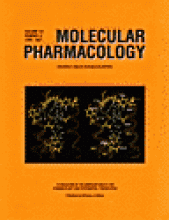Abstract
To study the role of mitogen-activated protein kinase in the regulation of M2 receptors, we studied the effect of platelet-derived growth factor (PDGF) on M2 receptor gene expression. PDGF (4 ng/ml) caused a time-dependent decrease in M2 receptor number and in m2 receptor mRNA levels in HEL 299 cells. The PDGF-induced loss in m2 mRNA required de novo protein synthesis and occurred through a decrease in the rate of transcription of the m2 receptor gene. The down-regulation of M2receptors was not accompanied by an uncoupling of the remaining receptors, indicating a large receptor reserve in these cells. Preincubations with the phosphatidylinositol 3-kinase inhibitor wortmannin, the protein kinase C inhibitor GF 109203X and the cAMP-dependent protein kinase inhibitor H-8 did not attenuate PDGF-induced down-regulation, indicating a lack of involvement of these enzymes in the down-regulation process. Activation of the extracellular signal-regulated protein kinase (ERK) 1 and 2 proteins was measured by an “in gel” phosphorylation assay. Carbachol did not activate ERK1 or 2, whereas PDGF and 4β-phorbol 13,14-dibutyrate resulted in a large increase in ERK1 and 2 activity along with a decrease in m2 mRNA. Preincubation with PD 098059, an inhibitor of mitogen-activated protein kinase kinase, inhibited PDGF- and 4β-phorbol 13,14-dibutyrate-mediated activation of ERK 1 and 2 in a concentration-dependent manner. The inhibitory action of PD 098059 was reflected at the mRNA level attenuating both PDGF- and 4β-phorbol 13,14-dibutyrate-mediated decreases in m2 mRNA. These results suggest a role of ERK1 and 2 in the regulation of muscarinic m2 receptor gene expression.
Footnotes
- Received March 26, 1997.
- Accepted August 21, 1997.
-
Send reprint requests to: Peter J. Barnes, Department of Thoracic Medicine, National Heart and Lung Institute, Imperial College, Dovehouse Street, London SW3 6LY, UK. E-mail: p.j.barnes{at}ic.ac.uk
-
This work was funded by the Medical Research Council, UK, and by a European Union postdoctoral fellowship fund (E.-B.H.).
- The American Society for Pharmacology and Experimental Therapeutics
MolPharm articles become freely available 12 months after publication, and remain freely available for 5 years.Non-open access articles that fall outside this five year window are available only to institutional subscribers and current ASPET members, or through the article purchase feature at the bottom of the page.
|






